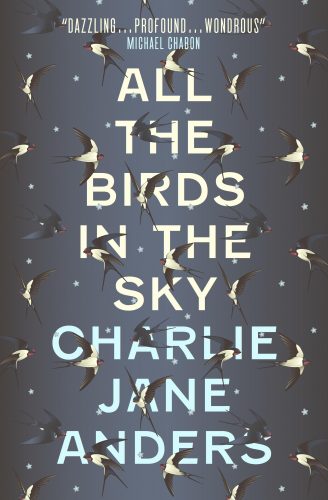So…hey there, reader. I’ve been away a while, with the exception of a few posts regarding that trip I took. Work’s been busy, life gets in the way, etcetera. In the couple of months since I last posted a review, I’ve read somewhere around a dozen books and stories, so in an effort to catch up to the schedule, I’ve set myself a rather aggressive review schedule. If, as I hope, I stick to that schedule, you can expect a review every other day through mid-November, possibly even into December. You ready? I am. Let’s do this.
[drop_cap]C[/drop_cap]harlie Jane Anders has been the talk of the Sci-Fi world this year, with her debut novel, All the Birds in the Sky, winning a Nebula and nomination for a Hugo, among its many other accolades. I think it deserves the praise.
All the Birds in the Sky is a story about abuse, growth, fear, artificial intelligence, the transcendental power of the mind, and the unknowable power of nature. It’s something of a treatise, from a Bay Area native, on the dangers of taking technology too far—something I’ve been thinking about quite a bit, incidentally.
The story follows the lives of two characters, Patricia and Laurence, who become friends as children, finding solace in each other’s company, processing their traumas together. They discover they’re a witch and gifted technologist, respectively, which drives a wedge between them, the resulting separation causing even more pain to each of them.
The three-act structure of the book is divided among periods in the protagonists’ lives, and leaps into their twenties—after Patricia has gone to Witch School after rescuing Laurence from a horrible military boarding school. Patricia has grown into a capable Healer, who cures people in San Francisco of all manner of ills, from actual sickness to fatal marital conflicts. Meanwhile, Laurence is a hot-shot engineer, whose connections and skill placed him in San Francisco as well, where he’s a rockstar in the tech industry. Our heroes meet again, at a party, and rekindle something of their old friendship. It blossoms into something more, and they work together to redefine themselves while recalling their traumas.
The final act consists of an epic conflict between the forces of witchcraft (nature) and technology, which, because it’s awesome, I won’t detail here. You’ll have to read the book. Which you should absolutely do.
Anders’s writing flows easily between ecstatic and window-pane, reserving stylistic flair for the moments of surreality that punctuate the novel. It creates a powerful effect—the contrast between the moments of magic and pain is stronger for it.
My only issue with the novel was the uneven pacing between the first act and the others. The first act—the childhood and abuses portion—was longer and slower-paced than its adolescent and adult counterparts and, for me, the latter two acts dealt with much more interesting philosophical questions about the nature of consciousness, morality, technology, humanity, and the limits of each of those subjects. Because the bulk of the action in the story takes places in the second and third acts, it feels like it races through those discussions, and I’d have liked to explore the topics a little deeper with her characters.
I loved the idea of putting technology and magic against each other in our world, especially one that I’ve become intimately familiar with throughout my (admittedly short) career. San Francisco and Silicon Valley are complicated places, and more than a few of the ideas that come out of these places could use the careful consideration that a book like All the Birds in the Sky gives to the merits of limitless technological progress.
I really enjoyed All the Birds in the Sky, and I think that chances are good that you’ll enjoy it too. If you’re eager to read it, consider clicking this here link to order it on Amazon, which will give your pal The Warbler a kick-back.

